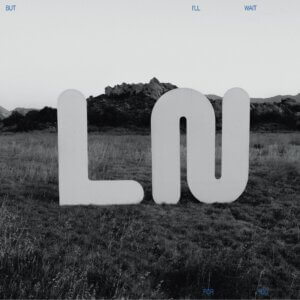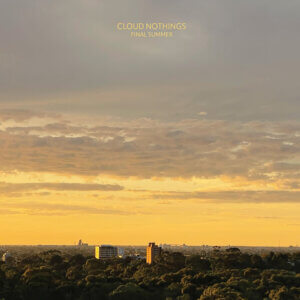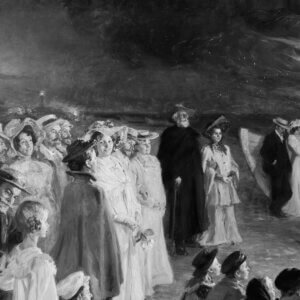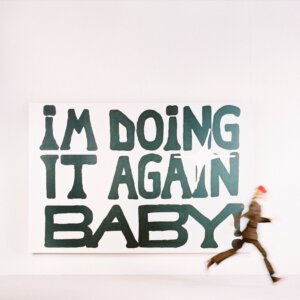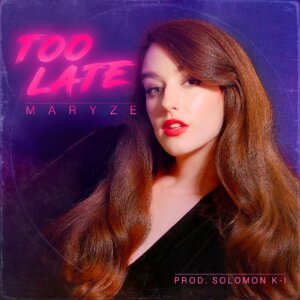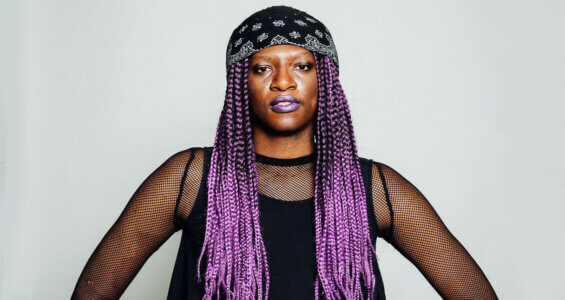Janette King Takes Off With “Airplane”

If nothing else, the socially distanced measures of the past year have given us plenty of time to take stock of our surroundings, re-evaluate our priorities, and figure out where we want to steer ourselves next. For Montréal-based producer and artist Janette King, she’s moving forward with What We Lost. Due June 25 via Hot Tramp, King’s full-length solo debut congeals the rhythms of pop, house, R&B, and more with simmering, introspective looks at “romance, the loss of close family members and skirmishes with mental health.”
While much of the album was prepped and finalized during lockdown, it took nearly four years for What We Lost’s newly released second single, “Airplane,” to take flight. It’s a song that brings you in with King’s soft touch vibrato, twilight synth shine, and propulsive house grooves, while likewise imposing both emotional and physical distance with its takeoff-related imagery.
Getting into it with Northern Transmissions, King detailed the origins of “Airplane,” comedy side ventures on TikTok, and what we’ll soon gain via the release of What We Lost.
This interview has been edited and condensed.
Northern Transmissions: You posted recently that you’ve been hanging onto “Airplane” for close to four years. What can you say about the overall creation of the track?
Janette King: Jordan Esau is the producer who I was working with on this track; we actually used to be in a band together called soclose. Initially, this song was meant for that band. It wasn’t one of those songs where we pumped it out and it was done. We had a few variations of it, and they’re all somewhat similar, but we were never really happy with it until we worked with a producer named Boha, who ended up mixing it. He really put the final touches on the track, and gave it a more techno/house vibe.
NT: If they added that house flavour, what had the vibe been like prior to that?
J: It was always a house track, but he mixed it in this way that’s really ‘90s, UK techno. He added the sprinkles on top that made the song pop.
NT: There are close to nine months between the release of “Airplane” and “Mars,” the first single from the album. Back then, you’d also announced that the record was going to be released this coming summer. Was planning out that far advance because of COVID, or have you been working on What We Lost along the way?
J: It was a combination of a few things. Definitely the biggest part of it was COVID; it put a damper on things. There were some family health issues as well that made it so I had to travel back and forth between Vancouver and Montreal. That halted things as well.
I used the pandemic to re-evaluate what I wanted the album to sound like. It just wasn’t a good idea to release the album right after the pandemic had started, so we decided to take the time to really put together an album that was super cohesive, and exactly what I wanted.
NT: This is maybe getting too literal with the imagery of “Airplane,” but while you’ve recently moved between Vancouver and Montreal, for many people the concept of air travel being easily accessible, and safe, is lost to a degree. What can you say about the unintended imagery of a song that was written four years ago, but released today in a very different landscape?
J: It’s funny, being on an airplane is super un-recommended these days. In terms of being on an actual airplane, it’s not an experience that a lot of people are having right now. It’s just a coincidence, how things turned out.
NT: What can you say about using an airplane within the song metaphorically, as a vehicle that facilitates distance?
J: That’s huge. The song is about feeling distant from a partner. There are a lot of layers to that, for sure—the person getting on an airplane and leaving symbolizing the ending of something, and also symbolizing something being so far away. Having that coupled with the pandemic… I think we’re all feeling lonely, to some degree.
NT: “Mars” is arguably taking the other side of that. It’s a hopeful song. This time you’re going the distance with someone, traveling in a spaceship from here to Mars…
J: I see what you’re saying: One song is more about two people coming together, and the other song is about two people separating—both use vehicles of transportation to [accomplish] that. I’ve always been traveling since I was a kid— going to England, France, and the Caribbean. Being on an airplane is something I feel comfortable with, it’s normal to me. And I’ve always wanted to be on a spaceship!
NT: We’re a few months off from hearing What We Lost as a whole, but what ties the songs together? What did that extra time with the songs afford you?
J: The pandemic, in general, has been a time of reflection, and also a time of huge loss. A lot of people lost their businesses; some people decided to take their life; some people lost their minds. Loss this past year has been a huge theme. I wanted to incorporate that on a deeper level with my own experience: dealing with depression, a loss of a sense of self, and figuring out where I’m going. Am I on the right path with my career? I was having these questions surface through this time, and I wanted the album to reflect that.
NT: Did working through any or all of that foment a different sense of self, whether artistic or for the day-to-day?
J: I think both. Because we were forced to stay inside, I had time to dive into the music and make the choices I wanted to make. That’s a big part of the album. I found myself through the creation of the album
NT: So you’re once again working with Jordan Esau, who had also produced a few tracks from your 143 EP. What are some of the other collaborations on the record that you’re excited about?
J: I was excited to work with a producer named Jonny Tobin. We worked on three songs together—he produced “Mars.” There’s another producer named GRAY, and we worked on two songs as well. I’m really excited about every song on the album, really.
NT: On a Hot Tramp tangent, both yourself and Maryze have been producing some comedy-related content over on TikTok. How has jumping onto TikTok been for you so far?
J: There’s been a learning curve. It took me so long to understand how to upload a video—I felt like an old person— but once you get into it, it’s fun. It’s like a big game. I feel like I’m a pretty comical person in real life, so it gave me this outlet to just make jokes and bring out my Caribbean side [that] my family and Caribbean folks can relate to—things that are funny to me that I want the world to know about. It gave me this avenue that Instagram can’t. Instagram, for me at least, is more dedicated to my music, things that are more professional. TikTok is this world that’s comical, fun, and light-hearted.
NT: Do you want to keep those social media worlds separate, or is it all part of the same promotion package at the end of the day?
J: I do want to stay the same through all my social media. I don’t want to be known as the comedy girl on TikTok, and then have my music stuff on Instagram. I would like to blend the two, but I think the way TikTok works the best isn’t necessarily [with] music stuff.
NT: In terms of being part of the Hot Tramp team, what is it like to be part of a united music collective?
J: It’s cool! I love Maryze, and I love Sara [Armiento, founder], and getting to know Alicia [Cara] has been nice. Alicia, Maryze, and I have different sounds, but we all share similarities in some ways. It’s been pretty cool to become a part of a femme-fronted label; I’m honoured to be a part of this team, and I feel supported by them.
Latest Reviews
Tracks
Advertisement
Looking for something new to listen to?
Sign up to our all-new newsletter for top-notch reviews, news, videos and playlists.
